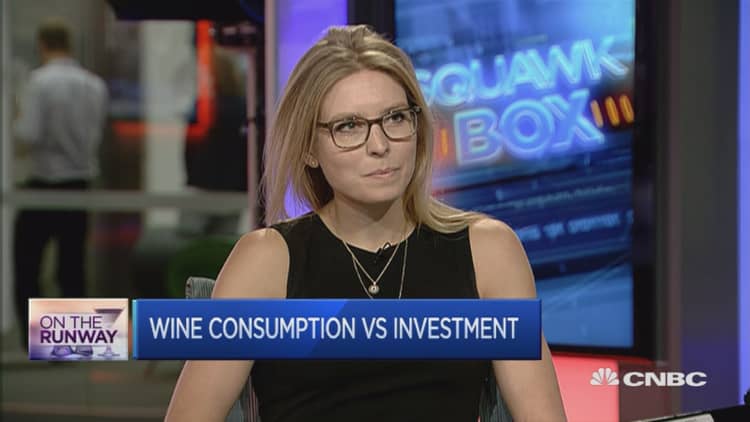In the current sobering environment of stock market volatility and uncertainty, investing in fine wines can provide a hedge against recession, experts have told CNBC.
One reason wine can provide investors with a hedge is that prices have a very low correlation with mainstream asset classes such as equities, argues Justin Gibbs, director of fine wine marketplace Liv-ex.
Year-to-date, the Liv-ex Fine Wine 50 index, which tracks daily price movements of fine wines, has grown by 16.20 percent.

"In a downward market, the tangibility aspect of wine represents a store of value. Thus, when equities suffer in a recession, fine wine can be considered a safe haven," Gibbs told CNBC via email.
"Also, the basic demand-supply equation applies. From the moment that the wine is bottled it begins to be consumed and supply gradually diminishes. Assuming that demand remains constant, this can have an upward effect on price."
However, the fine wine market, like all markets, goes through a boom-and-bust cycle. Market prices rose rapidly in 2008 and 2009 because of increased interest from Chinese and other Asian buyers, as well as the emergence of Hong Kong as a fine wine hub, until the bubble burst.
"Prices went sky-high until about June 2011 when the wheels rather came off and [investors] realised that there was too much wine in Hong Kong already," Giles Cooper, head of marketing BI Wines & Spirits, told CNBC during a phone interview.
"On top of that, you had people starting to cancel orders for the 2010 [vintages] they had bought, because they realised that they were being massively overcharged."
The market bottomed out in August 2014 and prices are ticking back up but are still below their peak, according to Cooper.
"It is a good time to look at wine as an investment again because some of the greatest ever wines are at prices which are a long way down from their release. For people looking for a mid–to –longer term hold, there are some significant potential."
Cooper recommended the 2010 Château Lafite Rothschild, which at one stage was priced at £14,000 ($18,000) per case, before collapsing to around £6,500.
"This is a very high scoring wine from what will certainly prove to be in the top three vintages of all time," he said. "At the moment, we are talking to a lot of people about positions on Lafite because prices have come down so far it really looks like there is a very considerable upside.
And over the long-term, fine wines have proven to be a lucrative investment.
"As a portfolio diversification tool, the long-term data suggests that fine wine is an interesting alternative asset," added Gibbs. "Detailed Liv-ex data going back to 1988 shows a compound average return on investment grade wine, specifically Bordeaux, of 12 percent."
Cooper suggested other vintages for investors to watch.
"Vintages like '82, '89, '90, '96, and 2000 are vintages that have very long potential lifespans. People that have them will continue to drink them for another 20, 30 or 40 more years but they are just starting to be able to consume now," he said.
"They are reaching the first level of their plateau and, as a result, we are shipping cases to Hong Kong or to the U.S. and you know they are going to collectors who are going to open them and drink them."


